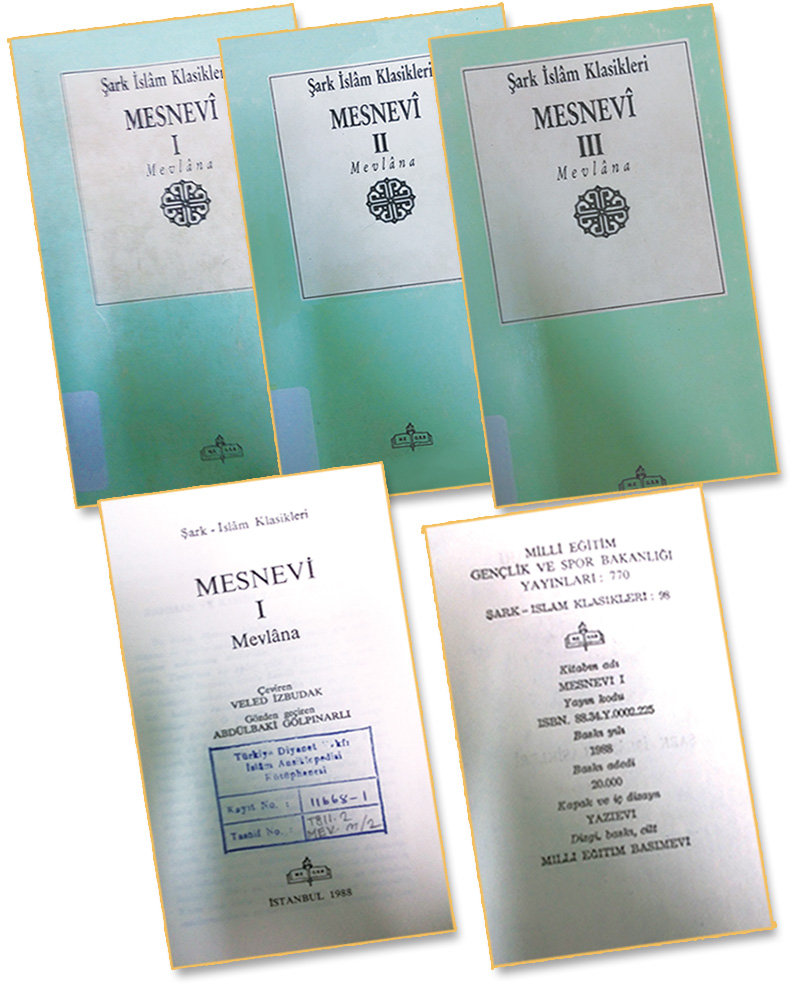The name Mevleviyya brings to many people's minds an order that was established in Anatolia, flourished under the leadership of Mawlana Jalal ad-Din Rumi and has influenced millions of people worldwide. Most people are of the opinion that Mevleviyya preaches love, humanity and brotherhood. Their knowledge about the order is only limited to Sheb-i Arus [Wedding Night] ceremonies. However, a closer examination through a discerning eye reveals a different situation.
Mawlana Rumi's books are widely known as Islamic works, but many people are not aware of the fact that these books include immoral parts, which contradict the Qur'an and might lead to serious societal moral degeneration. Here, it should be mentioned that these chapters, which are in contradiction with the Qur'an as we will discuss in detail in the following chapters, might have been added later to Rumi's books, written by someone else, and Rumi might have been completely unaware of all these statements. However, in the end, the books printed, published, distributed and quoted under the name of Rumi includes chapters depicting a philosophy and a lifestyle that is in complete contradiction with the Qur'an.
In fact, it is these parts of Rumi's works in contradiction with the Qur'an that lie at the root of advocacy of Rumi's philosophy by many people who are openly against Islam, who do not believe in God and recognize the prophethood of God's Messenger Muhammad (pbuh). These people are vehemently against Islam, yet they unwisely praise Rumi, adopt what is told in the books that are considered to be Rumi's and propagandize it.
Rumism bears in its essence unethical beliefs that are in complete contradiction with the Qur'an such as Darwinism that rejects God's creation, homosexuality that is decreed in the Qur'an as "an abomination" and rendered unlawful by God, insulting women and regarding them as inferior, disparaging the Turkish Nation by adopting a racist approach, and deeming the unlawful act of drinking wine lawful. Rumi's philosophy is exploited specifically and deliberately by certain circles to create a Muslim conception bereft of Islam and the Qur'an, and it should not be confused with Anatolian Mevleviyya.
Observing the common characteristics of the people who try to replace Islam with Rumism, one will see that the majority of them advocate homosexuality, carry out evolutionist propaganda despite the sheer lack of scientific evidence and hold a view of life that does not befit the Qur'anic moral values. And oblivious to these facts, many people unwittingly contribute to the insidious philosophy that is Rumi's philosophy when they relate and spread quotes -probably in good faith- from the books of Rumi.
Undoubtedly, a person's beliefs and way of life concern no one but the individual himself. In respect to God's commandment in the Qur'an that says, "There is no compulsion where the religion is concerned" [2:256], everyone is free in their choice of belief. However, it is within the right and responsibility of every Muslim to warn and inform other Muslims about Rumi's philosophy.
For centuries, this philosophy has been being consolidated and used calculatedly and deliberately to weaken, influence and manipulate Muslims. In such a critical situation that directly concerns the entire Islamic world, Muslims are naturally obliged to be sensitive, exercise caution against evil and enjoin good.
The following pages feature a collection of the said chapters found in the works attributed to Rumi, especially the Masnavi, which are mostly unknown to the public. These chapters in question also exist in the centuries-old Persian editions of the aforementioned books, as well as the editions printed, published and preserved in the libraries by the Turkish Presidency of Religious Affairs, the Ministry of National Education, the Ministry of Culture and various other Turkish governmental institutions and also in the worldwide recognized English versions of Rumi's books.
It should be reminded here again that not every person who believes in Mevleviyya and abides by the teachings of Mawlana Jalal ad-Din Rumi is a follower of Rumism. Philosophy of Rumi is a completely different system of belief that is in contradiction with the Qur'an and Islam. And the mainstay of Rumi's philosophy is the immoral parts that were probably added later to the books written by Rumi.
Therefore, it is significant that these parts of Rumi's books are made known to the public, as they may have been specifically placed in the books to the advantage of the opponents of Islam. It will then be possible to exclude these degenerate parts from the books and tenets of Rumi, thus purify the Mevleviya. What is even more important is that opponents of Islam will lose one of the crucial weapons they utilize against Muslims to be able to bring down Islam from within and maintain their grip over the Islamic geography.
Accomplishing this will thwart a historical conspiracy that has been set against Muslims, removing a major obstacle before the world reign of the Qur'anic moral values.
| Chapters Featured in This Book Are Taken from the Original Turkish Sources Published by the Turkish Ministry of National Education and Original English Sources by Other Respected Publishers |
 |
| Masnavi Books I-II-III-IV-V-VI |
 |
| Masnavi Books I-II-III-IV-V-VI |
 |
| Masnavi Books I-II-III-IV-V-VI |
 |
| Masnavi Books I-II-III-IV-V-VI |